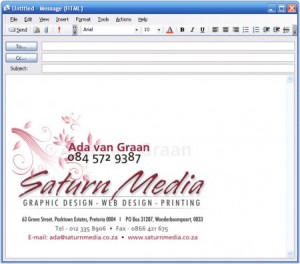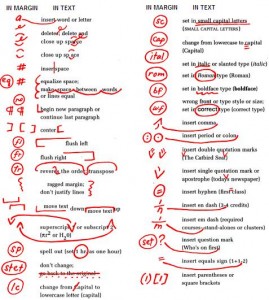jhaynes
This user hasn't shared any profile information
Posts by jhaynes

Marketing Tips For Your Email Signature
Email signatures are so commonplace, and in most cases, boring, that they are usually an afterthought to most. But they don’t have to be, and they can actually help you achieve your marketing and sales goals. I should quickly make note that when I say “email signature”, we are only talking about person-to-person emails, not the footer, etc. used on your email marketing or e-newsletter campaigns.
And make note that these tips don’t just apply to your own email signature. These strategies also work for your employees, your co-workers or team members, especially if they are sending out customer service or sales-related emails.
First the basics, those standard pieces of information that simply have to be part of your signature and those representing your business:
•Name, company name, address and phone number
•Twitter and Facebook links and encouragement for people to follow you
•Website and blog address
Then there are some more creative ways you can utilize the signature portion of your emails that aren’t necessary but could help you add to your social media connections, website visitors, and increase your sales:
•Your logo
•A “Deal of the Week” with a special link so you can track how it’s doing
•A link to “Join Our Monthly/Weekly Email Newsletter” and receive special email-only offers
•A customer testimonial so that your recipients can see how much your customers love you
•A link to a webinar or an event you want them to attend
So don’t let your email signatures be an afterthought!
And if you’re going to have a weekly deal, make sure you follow through and change your deal weekly. Some people might even begin to look for it.

More Tips on Creating Great Article Titles
Every site you submit articles to may have different editorial style guides. And as we have discussed before, having a great title can make all the difference in the world when it comes to your success. But even a catchy title needs to follow some basic guidelines.
Here are some helpful tips to use when crafting your titles to help you get your articles accepted more quickly:
Double-check spelling and word usage in your article title.
Do not put a period at the end of your article title.
All colons (:) and semicolons (;), long and medium dashes, pipes (|), and slashes (/) are to be replaced with two short dashes (–), or changed to word equivalents.
Ampersands (&) and parentheses () are allowed.
Quotation marks are allowed to emphasize a part of a title, but not the entire title. Please remove quotes around the entire article as they are superfluous and of no benefit to the author or reader.
Never put an article number in the title of an article, such as: Dog Grooming Tips-Article #3
Never purposefully use commonly misspelled words in your article title to try and gain traffic from people who mistakenly misspell words in their searches. It’s sneaky and will ruin your credibility as an expert author.
Never put a year or date in the title of an article. This greatly reduces the “shelf-life” and marketability of your article.

Proofreading Tips For Your Next Article
Article marketing can be one of the most user-friendly, reliable and cost-effective methods to boost your site’s SEO and overall traffic. But it does require some work. Every article you submit or distribute should be high quality, free of any spelling and grammatical errors and the misuse of any words. In general, something that you would be proud to see representing your company or brand.
In addition to the eyeballs that will be reading your article – and judging the company or author that created it – publishers also have guidelines, sometimes very strict, about what they will and will not accept. That’s why proofreading your articles is so important. Here are a few tips:
Give Your Article a Cool Off Period
After you’ve finished writing, step away from your article for a few hours before reading back over it. When you’ve been looking over a block of copy for an extended period of time, it becomes more difficult to see glaring errors, the kind you would instantly notice in other situations. Your mind may start to automatically fill in what you expect to see, not what is actually there on the page.
Read Your Article Backwards
This is a technique I have often used. Have you ever read an article so many times that you can almost recite it without looking? The more familiar you are with a piece of writing, the harder it becomes to proofread. So read the last sentence of your article, and then the second to last sentence, third to last, etc. Reading out of sequence takes away any familiarity and can help you to see grammar and spelling errors.
Print Your Article, Stand Up, and Read Your Article Out Loud
Hearing an article spoken aloud can be extremely effective at highlighting grammatical errors and awkward phrasing. Your ears can sometimes be more perceptive than your eyes. For maximum effectiveness, combine tips 2 and 3, and stand up and read your article aloud AND backwards.
Find a Friend with Excellent Editing Skills
If you have someone close to you with great grammar and spelling skills, see if you can enlist his or her help in looking over your article. A second set of eyes can be very helpful!
Make Sure Spell Checker Is On, And Grammar Checker Too
Spell checker has pointed out countless routine errors and typos from my documents, and though I find grammar checker to be a bit less useful, it doesn’t hurt to keep it on. But these are never substitutes for proofreading of course, since spell checker won’t find words misspelled that are still actual words (“Come to my part tonight” instead of “Come to my party tonight”) or words used incorrectly (“affect” instead of “effect”).
Remember that proofreading is important. It pays to take the extra time up front before publishing a blog post, e-marketing piece, uploading website copy or submitting an article or press release. This ensures that your online content represents your company in the best possible way, and puts the spotlight on your expertise and professionalism to all who you interact with online.
.
Need Help With Your Next Writing Project?
Contact me directly at: jhaynes@hattrickassociates.com or visit our Contact page and fill out the brief form.
Jim



